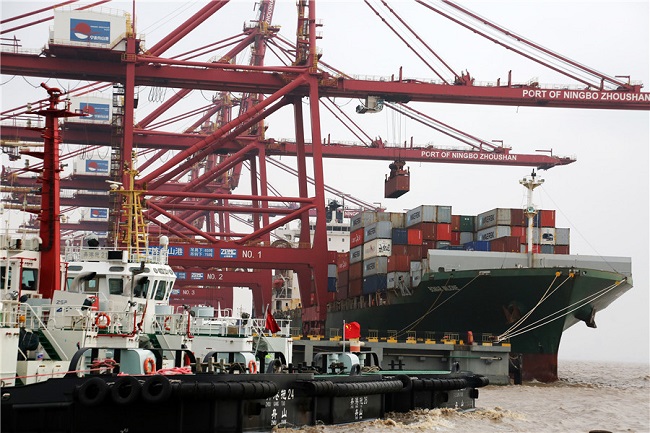Cooperation key to prevent global recession

A container vessel is loaded at Zhoushan Port, Zhejiang province.[Photo by Yao Feng/For China Daily]
Despite raised forecasts, world economy still faces uncertainties, economists say
International cooperation is a crucial driver of global growth and a key solution to preventing the global economy from falling into a deep recession, senior economists have said.
The global economic outlook has been dimmed by the COVID-19 pandemic, and this has seriously disrupted business and social activities as the virus has not been effectively and fully controlled globally.
Major international agencies and some economists have raised their forecast on global growth this year, given the better-than-expected recovery pace, but they warn that the global economy still faces immense uncertainties and the international community may experience the worst economic recession since the World War II if governments fail to adopt effective policies.
Boosting international cooperation and collaboration among governments is the only way out for the global economy, said Chen Wenling, chief economist at the Beijing-based China Center for International Economic Exchanges.
Chen warned that the global economy is threatened by risks including high debt levels, high government leverage ratios, the possibility of ruptured global supply and industrial chains and a rising unemployment rate.
"Countries around the world face a critical test, which is whether we can reach consensus that international cooperation is the biggest driver of global growth and a key solution to preventing the economy from falling into a deep recession," Chen said on Friday at the sixth Global Think Tank Summit, held by the China Center for International Economic Exchanges.
Forum participants shared that view and called for greater international collaboration in pressing for technological innovation and breakthroughs to fight the ongoing pandemic and to inject fresh impetus into global economic growth.
Wang Yiming, a senior economist and a member of the National Committee of the Chinese People's Political Consultative Conference, said countries should accelerate cooperation in the digital economy and promote green development, which are two important drivers of the global economic recovery.
Wang also said countries should make full use of multilateral platforms, including the International Monetary Fund, the World Bank and the G20, to strengthen dialogues and resolve debt and financial risks globally.
The United Nations Conference on Trade and Development said in its latest report that the global economy is likely to contract by 4.3 percent this year and the contraction will leave global output by the end of the year over $6 trillion short of economists' expectations before the COVID-19 pandemic. That contraction and shortfall would be the equivalent of a complete wipeout of the Brazilian, Indian and Mexican economies.
The UN agency also warned that global trade will shrink by about one-fifth this year and foreign direct investment flows by up to 40 percent.
China's prospects
Liu Yuanchun, vice-president of Renmin University of China, said at the forum that the technological revolution is one of the most crucial factors for the world to escape a lasting standstill in economic growth and countries need to break barriers and remove frictions that have arisen in trade, digital governance and the competition for talents.
China is expected to be one of the few major economies to see growth this year, and some international agencies have forecast that its GDP could rebound sharply to around 8 percent next year.
The profits of China's major industrial companies grew by 19.1 percent year-on-year in August as improved supply and demand helped drive industrial companies sales growth, the National Bureau of Statistics said on Sunday.
The supportive government policies-including the large-scale tax and fee cuts as well as reduction in electricity, land and rental costs-have also effectively reduced the companies' overall operational costs, the NBS said.


